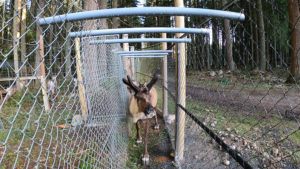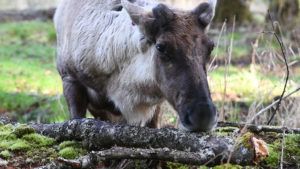“Caaaribou!” sings Northwest Trek Free-Roaming Area keeper Dave Meadows.
The morning sun seeps through the trees and the birds are chirping.
It’s an exciting day in the park. It’s the day the woodland caribou will leave their behind-the-scenes winter home and join the other animals in the 435 acre Free-Roaming Area.
Each fall during elk breeding season or “rut”, the bull elk battle over dominant status and mating rights. To keep the caribou safe, the caribou are taken to their own large, forested space, away from the rutting elk.
On this sunny March day, Meadows calls the caribou. They know his voice, and know he has food, and they trot right up to him.
“Follow me caribou!” he says.

Meadows and other Northwest Trek keepers created a new chute for the caribou that leads from their behind-the-scenes space to the Free-Roaming Area. The caribou have never used it before, and take some time figuring it out. One caribou walks halfway down the chute, then turns around.
“Caaaribou! Come on! It’s OK!” whispers Meadows.
After about 20 minutes, one caribou figures it out.
She gallops out into the Free-Roaming Area, joining bison, mountain goats, moose and elk. The other 12 caribou watch her.
Another 10 minutes pass, and another curious caribou walks through the chute. The others catch on, and all quickly follow, galloping off together.
“With the start of spring, there’s also plenty of new green foliage for them to enjoy in our Free-Roaming Area,” said Meadows.

The chute will remain open for caribou to freely go in and out, where their food will remain.
“We don’t want them to have to compete with elk, moose and bison to get food. Elk, moose and bison won’t be able to fit through the chute,” said Meadows.
Woodland caribou are endangered in the U.S. Only a few are seen each year south of the Canadian border. At around 4-5 feet in height, they’re smaller than elk and moose, but bigger than the black-tailed deer that also share Northwest Trek’s large Free-Roaming Area.